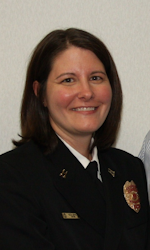When a local Boy Scout leader calls and says he’s working on fire safety, or when the Senior Center calls and wants a fire prevention presentation, are you ready to respond? Do you have specific presentations set up for different audiences? Do you know where to get help?
Turning these groups away can be a nightmare for your department’s public image. The Scout leader and the Senior Center director talk to friends and neighbors — and they’re not shy about expressing themselves when their requests get blown off by a fire chief. It doesn’t get any more positive when the message is relayed to city council members, the city manager or the mayor — and a public relations issue can turn into a lower budget in the next funding cycle.
Sending unprepared firefighters out on public education missions can cause similar damage. A couple of bad reviews and the public will stop asking for your help. So, where do you start?
First, check the National Fire Incident Reporting System (NFIRS) data or your state’s Fire Incident Reporting System to identify the most common calls to which your department responds. These are your community’s main fire problems. If you don’t have access to your own current data, use the national trends. Choose three or four and develop messages around those types of calls.
Start with an outline on each of your fire problems. Under each topic you can list messages that will teach the public how to prevent those types of fires. For example:
I. Cooking Fires – Main Problem
A. Watch what you heat - Message
- When you are broiling, frying, or grilling, stay in the kitchen – Call to action
- If you must leave the room, turn off the stove
- Keep anything flammable away from the stovetop, including dish towels, oven mitts, food packaging
B. Know what to do if you have a grease fire
- Never use water on a grease fire
- Keep a tight fitting lid nearby if you are frying greasy foods
- a. Slide the lid over the top of the pan and leave it
- b. Turn off the heat
- c. Call 9-1-1
II. Heating-Related Fires
A. Use your fireplace properly
- Have your fireplace inspected and cleaned by a professional
- Don't burn wrapping paper or other loose flammables in the fireplace
- Keep matches and lighters away from small children
B. Understand the dangers of space heaters
- Ensure your space heater has been approved by a qualified lab (UL)
- Only use a space heater that shuts off if it tips over
- Keep flammable items at least three feet from the heater
III. Smoking-Related Fires
A. If you smoke, be alert and aware
- One in four fire fatalities due to smoking related fires is not the smoker whose cigarette started the fire
- Choose fire standard compliant cigarettes, which are mandated in most states
- Use deep, wide ashtrays
- Make sure that your cigarette is completely extinguished before walking away
- Keep lighters and matches away from children
IV. Juvenile Fire Setters
A. Keep lighters and matches away from children
- Teach young children not to play with matches and lighters a. Matches and lighters are tools used by adults, not toys
- Almost half of juveniles involved in fires as a result of fire play were five years old or younger.
- a. Children as young as two years old have been determined to start fires
Once you’ve identified key messages, give them to all your firefighters; this will give your department a unified voice. You can also create a PowerPoint presentation, posters, flyers and other materials using those key messages. You should tailor your message to different age groups by considering their specific activities and challenges. (Playing with matches probably isn’t a problem at the senior center, and the Boy Scouts may not do a lot of cooking yet.) A great resource for obtaining the call to action messages is from the NFPA's Educational Messages packet.
Another benefit of centering messages on your community’s most common calls is that you can track trends by looking at your data in those areas over time. You will be able to show elected officials that the efforts of your fire department have reduced fall hazards in the senior population, for example, or decreased the number of inattentive cooking fires. This will illustrate for them how your service to the community goes beyond response and suppression.
As firefighters, we train and prepare constantly, so we’re ready to go when we get the call. In the same way, public education requires forethought, planning and training.
BECKI WHITE is a deputy state fire marshal and fire safety educator with the Minnesota State Fire Marshal Division. You can reach Becki by e-mail at [email protected].

Becki White | For Firehouse.com
Becki White is a Deputy State Fire Marshal and Fire Safety Educator with the Minnesota State Fire Marshal Division and a Captain on the Eden Prairie Fire Department. She has a Masters of Education in Teaching and Learning and was an elementary teacher for twelve years. White has combined her passion for education with her knowledge and experience in the fire service to become a resource for Minnesota fire-and-life safety educators. She publishes monthly fire safety newsletters, creates fire-and-life safety curriculum that meets National Education Standards, and develops fire safety materials and presentations that can have been used by fire departments in her state and around the country. Fire-safety games created by White have been played online around the world.
Becki White holds state certifications in Firefighter II, Public Fire-and-Life Safety Educator II, and Fire Investigations. She is Vice President of the North Star Women’s Firefighter Association, a nonprofit organization that assists with mentoring, networking, and training women in the fire service.





